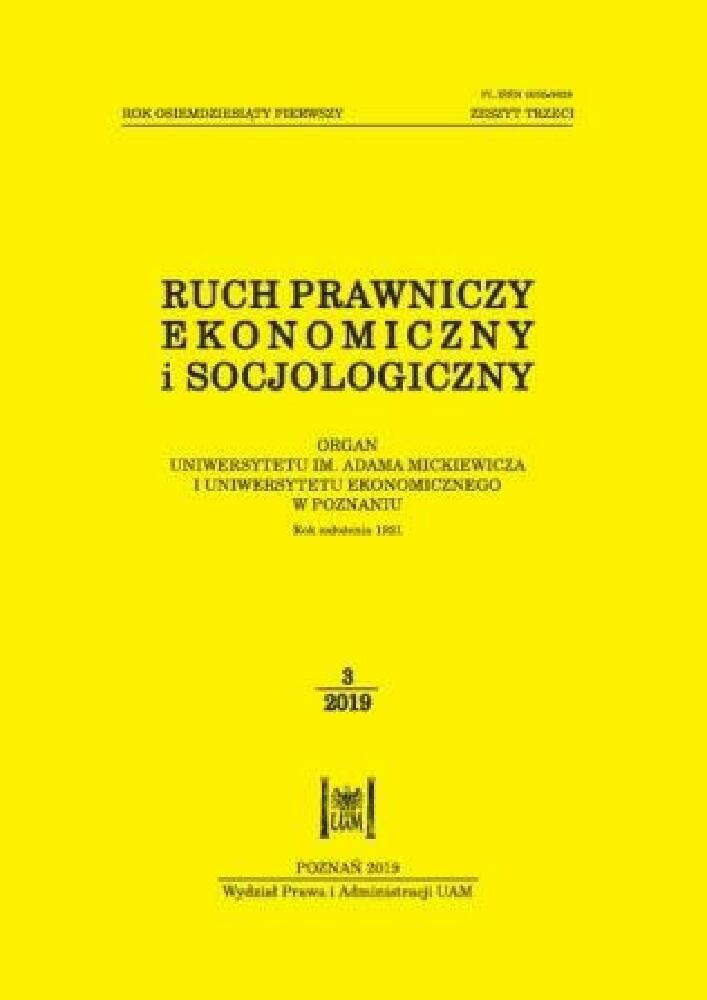Abstract
New legal regulations concerning the organization, structure and functioning of science and higher education, called the Constitution for Science 2.0 (Act of 20 July 2018 on Higher Education and Science), mean a revolutionary transformation of Polish scientific and educational institutions. The proposed changes, even though they were widely expected in academic circles awaiting a
systemic reform, raise many objections and hopes at the same time. However, the changes are being gradually implemented and one must adapt to them (dura lex sed lex). Therefore, while adapting our activity to the new conditions of the functioning of the university, when co-creating its new structure, registering one’s own scientific and didactic activity as a new branch and discipline of science, and taking a particular position regarding the ongoing changes, it may be worth paying attention to the fact that the university as a whole is our common good and its effective functioning is a common interest of the academic community. The article aims to apply the ideas of the common good and the common interest to understanding the university and the functioning of its community. This is important when new legal regulations, being a new challenge, are probably also an opportunity for the further, successful development of the institution we all work in. These kinds of deliberations are preceded by a reconstruction of the state of Polish science and higher education in the years before the changes were implemented, together with the changes that were suggested over the years. The reflections contained in this text may be helpful in our thinking and our activity. This paper presents the subjective views and opinions of the author. It is dedicated to the late Professor Teresa Rabska, the Editor-in-Chief of the Ruch Prawniczy, Ekonomiczy i Socjologiczny (Journal of Law, Economics and Sociology) for many years, who, as a Vice-Rector of Adam Mickiewicz University in Poznań, in the difficult times of martial law encouraged her co-workers to defend this common good, which is the university, and to care about its prosperity.
References
Bereś, B. (2008). Dobro wspólne jako cel i kryterium życia społecznego. Aspekt pedagogiczny. Roczniki Nauk Społecznych 36(2): 127–134.
Bertalanffy, L. von (1950). An outline of general system theory. British Journal of the Philosophy of Science 1(2): 134–165.
Bertalanffy, L. von (1968). General System Theory: Foundations, Development, Application. New York: G. Braziller.
Chojnicki, Z. (2000). Filozofia nauki. Poznań: Bogucki Wydawnictwo Naukowe.
Czyż, T., Chojnicki, Z. (2008a). Gospodarka oparta na wiedzy jako czynnik rozwoju regionalnego. Biuletyn KPZK PAN 237: 146–158.
Czyż, T., Chojnicki, Z. (2008b). Gospodarka oparta na wiedzy w regionach metropolitalnych i aglomeracjach miejskich w Polsce. Studia KPZK PAN 120: 74–95.
Duniewska, Z., Jaworska-Dębska, B., Michalska-Badziak, R.,
Olejniczak-Szałowska, E. (2002). Prawo administracyjne pojęcia, instytucje, zasady w teorii i orzecznictwie. Warszawa: Wydawnictwo Difin.
Hussain, W. (2018). The common good, [w:] Stanford Encyclopedia of Philosophy. Stanford. Center for the Study of Language and Information [Online: https://plato.stanford.edu/entries/common-good].
Krąpiec, M.A. (2001). Dobro wspólne, [w:] Powszechna encyklopedia filozofii. Tom 3. Lublin: Wydawnictwo Polskiego Towarzystwa Tomasza z Akwinu: 628–639.
Lipowicz, I. (2017). Dobro wspólne. Ruch Prawniczy, Ekonomiczny i Socjologiczny 79(3): 17–31.
Majka, J. (1982a). Etyka życia gospodarczego. Wrocław: Wydawnictwo Wrocławskiej Księgarni Archidiecezjalnej.
Majka, J. (1982b). Filozofia społeczna. Wrocław: Wydawnictwo Wrocławskiej Księgarni Archidiecezjalnej.
Piechowiak, M. (2003). Filozoficzne podstawy rozumienia dobra wspólnego. Kwartalnik Filozoficzny 21(2): 5–35.
Prigogine, I., Stengers, I. (1990). Z chaosu ku porządkowi. Biblioteka Myśli Współczesnej. Warszawa: PIW.
Stachowiak, K. (2017). Gospodarka kreatywna i mechanizmy jej funkcjonowania. Perspektywa geograficzno-ekonomiczna. Poznań: Wydawnictwo Naukowe Uniwersytetu im. A. Mickiewicza w Poznaniu.
Stryjakiewicz, T., Kaczmarek, T., Męczyński, M., Parysek, J., Stachowiak, K. (2007). Poznań Faces the Future. Pathways to Creative and Knowledge-Based Regions. Amsterdam: University of Amsterdam.
Tischner, J. (2018). Historia filozofii po góralsku. Kraków: Znak.
Ziółkowski, M. (2000). Przemiany interesów i wartości społeczeństwa polskiego. Teorie, tendencje, interpretacje. Poznań: Wydawnictwo Humaniora.
License
Copyright (c) 2019 WPiA UAM

This work is licensed under a Creative Commons Attribution-NonCommercial-NoDerivatives 4.0 International License.





